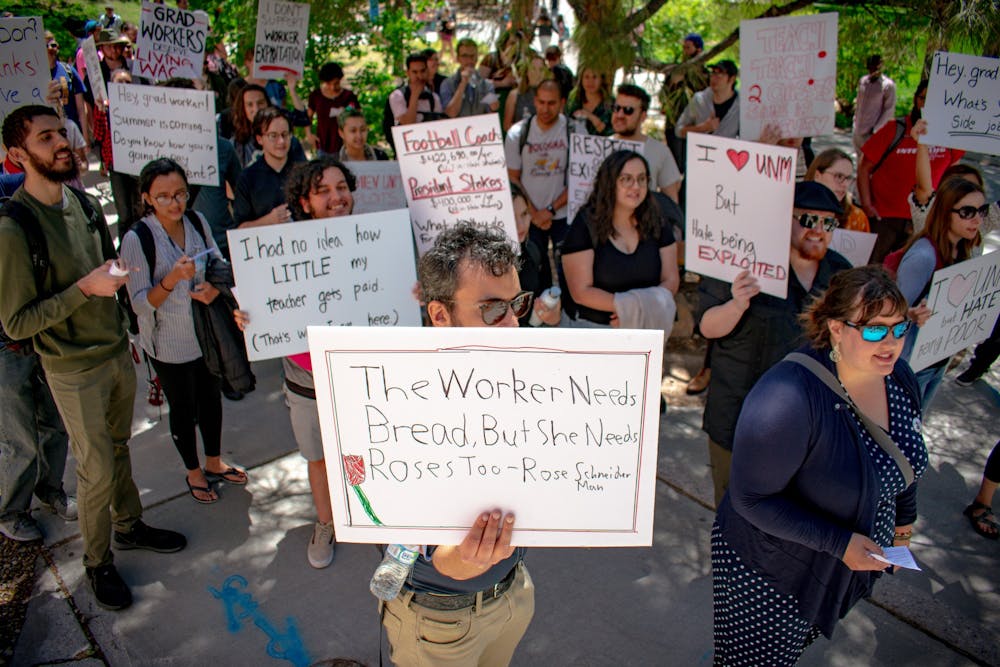At a virtual town hall attended by over 150 people, University of New Mexico graduate student workers discussed how the administration has continuously ignored their concerns related to pay and working conditions.
Now, they’re organizing a union.
“This is a historical moment for us to be organizing and unionizing during a pandemic,” United Graduate Workers of UNM organizer and Chicana/o Studies PhD candidate Natalia Toscano said. “The fact is that we’re standing up to ensure that all workers have a voice at the table and that we’re getting all of the benefits and pay and resources that ensure that we live full and dignified lives.”
One of the main topics of discussion at the town hall was pay. The Massachusetts Institute of Technology calculated the living wage in Albuquerque for a single adult with no children to be $23,213 a year. UNM’s minimum teaching and graduate assistant stipend is a mere 61% of that living wage.
“You might hear in the following months that UNM doesn’t have the money to be able to afford a decent living wage and (the) protections that we’re asking for, especially since COVID,” linguistics PhD candidate Lindsay Morrone said. “But looking into UNM’s finances a little bit more, we’re going to see that’s not actually the case.”
Tuition was raised this semester, and there were enrollment increases in some key categories. This year’s entering freshman class of 2,788 students is an increase of 7.6% from last year.
Morrone also pointed out that UNM Athletics and the UNM Police Department have both received budget increases over the past few years. Several students sounded off in the chat about how UNMPD “makes students unsafe” and “overpolices” people on campus.
Other graduate student workers talked about experiencing harassment and discrimination and feeling uncared for by UNM.
“Since I began my career in STEM, I have faced both racism and sexism,” Annie Montes, a Latina graduate student in the biology department, told the Daily Lobo. “When I began graduate school, I realized that in addition to these issues, I would have to deal with unfair pay, menial health benefits and a broken system that doesn’t appear to care about my best interests.”
Jens Van Gysel, a linguistics PhD candidate, said that the graduate student population has recently tried without success to get the administration to listen to them. Early on in the pandemic, a petition demanding certain protections for graduate student workers gained over 1,000 signatures but went largely ignored.
“Grad workers have been living in financial insecurity for long enough, and we really can’t go one more semester like this,” Vans Gysel said. “We don’t want to fight against the University. All we’re asking is a say in how the University’s money — which we generate a lot of — is being spent and what the conditions are under which we have to do our work.”
Axel Gonzalez, an American Studies PhD candidate, spoke about the process behind forming a union.
Once a majority of graduate student workers sign a support card, they can petition the Public Employee Labor Relations Board (PELRB) for recognition as employees, not students.
Get content from The Daily Lobo delivered to your inbox
When asked by the Daily Lobo if graduate workers are currently recognized as public employees, PELRB executive director Thomas Griego said, “This is an open question that has not yet been addressed by this board. It would not be appropriate for me to comment on an issue that may come before us for adjudication.”
Organizers at the town hall insisted that they are indeed recognized as employees, and they seem to fit into the category under the state’s Public Employee Bargaining Act definition.
After being recognized by the PELRB, the University would be legally required to recognize the union, at which point a collective bargaining agreement would be negotiated. Typical contract provisions for unions include better pay and medical benefits, restrictions on workloads, guaranteed paid leave and protections against discrimination and harassment.
Graduate worker unions have made some hard-fought gains in recent months, as the Washington Post reported. Unions at eight private universities now have collective bargaining agreements, and contracts have also been approved at public universities like Oregon State University.
Bella Davis is a senior reporter at the Daily Lobo. She can be contacted at news@dailylobo.com or on Twitter @bladvs






